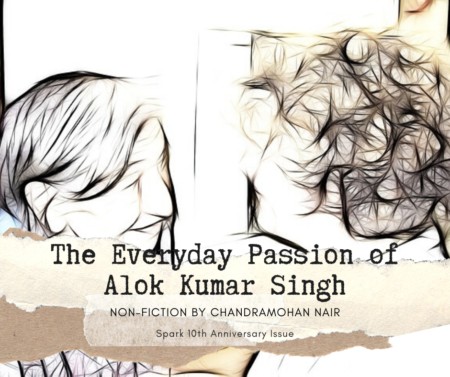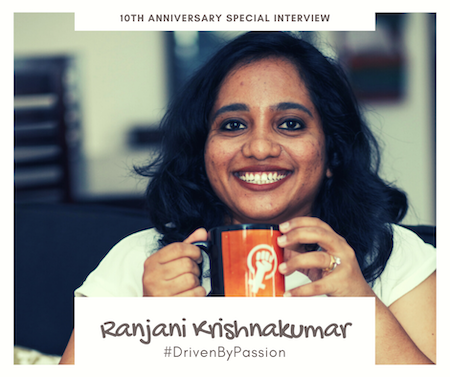by Chandramohan Nair
Chandramohan Nair writes about his acquaintance with a man from a small village in Bihar, who makes him ponder about passion, the purpose of life, and thwarted potential.
There had been a lull in the retreating monsoon and the stifling mid-morning Kochi heat engulfed our living room. I was into my detailed perusal of the day’s newspapers which were, as usual, full of stories that highlighted the worst of human nature. From the kitchen I could hear the strains of the 1950s hit Mera Joota Hai Japani. The patriotic sentiments in the lyrics were depressingly out of place with the happenings in the country. But the music did signal that Alok, with his inseparable mobile at hand, was engrossed in his cooking and that all was well, at least, in his world.
Alok Kumar Singh had been with our family for the past four years. He belonged to a village close to Madhubani in North Bihar and we had brought him over to look after my father-in-law who had been suffering from dementia for some years. Before his arrival there had been a succession of young men trying to measure up to the demands of being a caregiver. They had found the role arduous considering the nature of the malady and the fact that none of them had the background or training to take up such a vocation. They were largely youth who had little or no schooling and had earlier worked as casual labour or as household help. It was little wonder that none of them had been able to endure the stress of the job for much more than a year.
At first glance, Alok had not inspired confidence. An unsmiling and stern visage with eyes that were always wary suggested someone who was not naturally comfortable with people. A loud voice with rough edges did not help either. He was also much older – in his early forties and a father of three children – which was bound to make the process of learning and adjustment more difficult. I marked him in my mind as another early leaver.
The first few weeks supported my prognosis. He struggled to establish a rapport with my father-in-law and was slow to pick up instructions. But on the positive side, he was prepared to persevere till he got things right.
Just three months later I realised how deceptive appearances and initial judgements could be. We found that if our directions were clear and detailed Alok would over time become proficient and execute them not just meticulously but with compassion. This was apparent from the gentle manner with which he helped my father-in-law with his morning ablutions, the care with which he dressed him up and the patience he displayed in feeding him even when in a stubborn or belligerent mood. He also learnt to identify the numerous tablets that were prescribed by colour, shape and size and would immediately spot it if we missed out on a medicine. He was truly a saviour as far as my father-in-law was concerned.
Considering the demanding nature of the job, Alok’s predecessors were in the habit of taking a much-deserved break whenever my father-in-law was resting or dozing off. Alok was remarkable in that not only did he rarely appear fatigued but he would get restless at such times and volunteer to do any other work about the house.
It was thus that we discovered that he was a perfectionist of sorts and that his talents extended to cooking, gardening and spring-cleaning. His adrak chai became an addiction for anyone who tasted it along with the perfectly shaped paper-thin dosas that he quickly learnt to make. It took him some time to master our mandatory afternoon sambar but he made it almost an art form with the vegetables that he cut having a pleasing symmetry about them.
This natural talent for working with his hands manifested in several ways other ways. Our garden thrived under his care and he would come running with delight to announce the blossoming of a new flower. Even as mundane a chore as that of folding clothes after they had dried was elevated to a higher plane. After some dexterous stretching, folding and patting in his hands the clothes would look as though they had been freshly removed from their wrapper.
But his forte was spring cleaning – be it a room, a cupboard or a kitchen shelf. At such times his usual playlist from Bollywood hits of the 50s and 60s would give way to songs in his native Maithili to whose strains he would hum along. Armed with a duster, a broom, a heap of old clothes and detergent water he would plunge into the task with unreserved enthusiasm. At the end of his exertions, we would invariably be taken aback by the amount of dust and grime he uncovered.
Alok’s sincerity and remarkable work ethic had impressed all of us and made me curious to discover the forces that had shaped him as a person. Although it was just the three of us at home for the most part of the day, the fact that Alok was anything but a natural conversationalist, along with his constant absorption in work, mean that it took me quite some time to piece together his story, prompting him every now and then about his past.
His father, a beedi worker, had passed away when Alok was eight years old, forcing his mother to work on daily wages to raise him and his three sisters. A benefactress appeared in the form of his father’s well-to-do cousin sister who volunteered to take Alok with her to Bhagalpur and see him through school. Sadly, his aunt’s intentions were less than honourable and Alok ended up spending the next eight years as a house help in her house.
He was treated heartlessly, working fifteen-hour days, waking up before dawn to fill up water for the day. He would often go hungry and get punished for minor slip-ups. His cooking, housecleaning and gardening skills were acquired during this unhappy period.
The only indulgence he was permitted was viewing the Ramayan and Mahabharat serials, which left an indelible impression on his young mind. He was also allowed to make a yearly trip to meet with his mother and siblings but there was little they could do other than sympathise with his plight.
After eight years of this drudgery, a distant relative helped him get work, again as a house help, with a professor’s family in Patna where he was much better treated. Now reconciled to working as a household help, he then served with an army officer in Ludhiana and then with a family in Gujarat expanding his repertoire of culinary skills.
Marriage made him look at job opportunities outside households so that he could bring his wife to stay with him. During the early 2000s, the real estate boom in Mumbai had led to an acute shortage of construction workers. Alok was hired by a sub-contractor for cutting and bending steel rods. He spent a decade in Mumbai, living with his wife and expanding family in makeshift tin sheds while working on projects that included the world’s most expensive private residence. The post-Lehman economic slowdown along with the need to provide his family with a settled life made him send his family back to his village and take up his old metier of house help again.
His ability to immerse himself in his work must have had as genesis his traumatic experience at his aunt’s place, where diligence at work must have been a child’s coping mechanism to avoid punishment and, if possible, secure approval. After that first shock, he had been well looked after and appreciated by all his subsequent employers and this must have strengthened his belief in work as a source of fulfilment.
Beyond work, Alok’s only focus in life was the well-being of his family, particularly his children. He would spend hours each day talking to them and this seemed both a source of motivation as well as relaxation for him. He referred to his daughter as gudiya and the pride in his voice was unmistakable when he talked about her studying in the 10th standard – a rarity for girls in their family and village. His dream was to get her to complete a degree course and to get his two sons to take up a vocational course and became self-employed.
“They should never work as a household help like me, Mohan bhaiyya,” he would tell me in his halting Hindi, without a trace of self-pity or resentment.
Alok was largely ignorant of and disinterested in what one would consider basic general knowledge about history and the physical and natural world. His lack of schooling and his inability to read could only partially explain this. I sensed that his childhood experiences must have dulled his curiosity very early and also led him to create a mental universe confined to comforting thoughts of his family and village.
The ancient Greeks considered the purpose of life as the pursuit of knowledge and by this token, I would think of Alok’s life as a tragedy of unfulfilled potential. But my armchair sympathising had an uncomfortable element of hypocrisy in it as we had, in a sense, benefited directly from this thwarted potential.
The lovely melody of Suhana Safar Aur Yeh Mausam Haseen coming in from our garden broke my thoughts. Cooking over, Alok was now watering the plants.
I was now tempted to see Alok as a man who had braved adversity and fashioned a Suhana Safar (a wonderful/pleasant journey) for himself out of his passion for work.
But I knew that my sentiments, both of sympathy and of praise, were at best an easy salve for my conscience.
Instead, the best I could do was to pray that Alok’s fragile little universe would remain tranquil and secure for as long as possible.
Chandramohan Nair lives in Kochi and has taken up writing after a career in the banking and technology sectors.







Lovely and very compassionate endearing account Mohan.